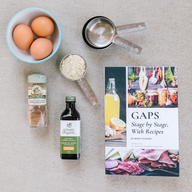 Various herbs, those green leafy plants, are used worldwide as seasonings, adding unique flavors to our meals depending on the type of herb used. Did you know that herbs have been valued for centuries not only for their flavor but also for their health benefits? Their healing properties are increasingly appreciated today, as evidenced by the growing number of dietary supplements made from them. My herbs and spice cabinet is filled with a variety of organically grown dried herbs, which I love adding to my meals, especially during winter. However, the flavor and aroma of fresh herbs are incomparable to their dried counterparts.
0 Comments
 Inflammation is a word we hear more and more often and it’s rarely for good reasons… Scientists are measuring levels of inflammation in our bodies and finding that it can be pretty bad for our health; this is especially true when it's chronic (i.e. lasts a long time). Inflammation has been linked to health conditions such as obesity, heart disease, Alzheimer's, and diabetes, just to name a few. So today, I'd like to focus on some foods packed with antioxidants and other anti-inflammatory nutrients that are proven to help reduce chronic inflammation.  Many clients with digestive problems experiment with various dietary strategies or opt for quick fixes before considering my assistance. They struggle not only with repairing their damaged gut function but also with one of the most common feelings when it comes to digestive health, doubt: "I've tried everything; how will this be any different?" I understand the frustration. They've explored low carb/keto/low FODMAP diets, intermittent fasting, trendy supplements, cleansing teas… All while managing their demanding lifestyles. So, OF COURSE, it seems like nothing is working.  "Leaky gut" has been blamed for many symptoms and conditions that seem to be all-too-common these days. Allergies, intolerances, joint pain, even autoimmune diseases can all be linked back to leaky gut. What is a leaky gut? Your gut helps your body absorb fluids and nutrients, digests your food, and houses billions of friendly gut microbes. It's also selective to what it allows past its barrier. Your intestinal tract purposefully keeps some things from being absorbed, so they pass right on through to the other end to be eliminated as waste. You don't want to absorb many harmful microbes or toxins into your body, right? Once the essential nutrients are absorbed by the cells of the gut lining, they are carried by the blood and lymph to your liver, and then around to the rest of your body; this is so that all your cells, all the way to your toenails, get the nutrition they need to be healthy and grow.  FOOD INTOLERANCES or "SENSITIVITIES" can affect you in so many ways. And they’re a lot more common than most people think. I'm not talking about anaphylaxis or immediate allergic reactions that involve an immune response. Those can be serious and life-threatening. If you have any allergies, you need to steer clear of any traces of foods you are allergic to, and speak with your doctor or pharmacist about emergency medication, if necessary. What I'm talking about, is an intolerance, meaning you do not tolerate a specific food very well and it causes immediate or chronic symptoms anywhere in the body. Symptoms can take hours or even days to show themselves. And symptoms can be located just about anywhere in the body. This is what makes them so tricky to identify.  While Hippocrates coined the phrase, “all disease begins in the gut” thousands of years ago, current research is finding there’s much truth in this ancient piece of wisdom! If you think your intestinal tract is only responsible for digestion and waste elimination, think again… your gut also plays a big role in immune system function, the synthesis of essential nutrients, and balancing neurotransmitters important for brain and mood health. It’s even been referred to as our second brain by experts in the health professional community. It’s all about the health of our gut Your intestines are home to billions of bacteria, collectively known as the microbiome. Some of these bacteria are beneficial and some are not, but the balance between the two is really key to normal digestion, proper absorption of nutrients, and promoting a healthy intestinal environment. The integrity and structure of the intestinal walls is also extremely important when it comes to good gut health - and our health overall. The gut lining is a permeable barrier designed to allow certain molecules, like broken down nutrients from food, to crossover into the bloodstream for absorption and use in the body. But, the gut lining should also keep harmful molecules, like toxins and pathogens, from being absorbed.  I have to be honest: self-care was never an essential part of my lifestyle. I always felt that I did not need it, that I was always perfectly fine. As a busy person who was always on the go, I did not feel like I needed to slow down and reserve some time to replenish. Up until recently... In my previous blog post (you can read it HERE )I explained the circumstances that made me realize that there are times in our lives when focusing on self-care is absolutely necessary for our physical and mental health. In the past few months, constantly stressing and worrying about my family made me feel fatigued, burnt out, and left me craving sweets. However, the most severe effect that this had was the toll it took on my sleep. As my sleep quality was disastrous, I was constantly tired, barely dragging myself through the day. I was waking up frequently at night and had a hard time falling back asleep. Quite often, I was up for hours, just tossing and turning. Since poor sleep was the most troublesome of all the symptoms I experienced, I knew it had to be addressed first if I was to establish a new and effective self-care routine. Here are a few practices that I introduced and have been implementing daily since then.  Those of you who have met me know that I am an optimistic person. I always look at the bright side of things and pick myself up quickly when I experience setbacks or when things don't work out ideally. Unfortunately, there are difficult times and situations in our lives when we lose our energy, our motivation, and our optimism no matter how resilient and positive we are. The last few months proved to me that just like anybody else, I am not immune to stress. I am no superwoman! Having my son hospitalized in one of Europe's coronavirus hotspots and worrying about the health of my 89-year-old Dad and my sisters (who also belong to the high-risk seniors category) took a heavy toll on me. I became anxious, started to have serious sleep issues, felt constantly fatigued and had no driving "juice" in me. None! What made this situation even worse was that I did not admit to myself that something was wrong with me. How could anything be wrong with me? I am a holistic nutritionist, who eats healthy 80% of the time, who lives a healthy lifestyle, who is always calm and handles stress very well... Of course there is nothing wrong with me! I'm just a bit more tired than usual.  How are you doing? Are you staying at home because you were laid off temporarily, or because you are working from home, or because you are self-isolating? Are you alone or with your family? Are you home-schooling, cooking, or looking for new activities to keep everybody busy all day long? Are you reading the news? Statistics? Are you feeling anxious? Having sleep issues? Munching continuously on something? Feeling that if there is one more problem to be solved, you are going to lose it..? Let me assure you, this is completely normal. You are not alone in having these feelings.  Many of my clients struggle with various gut problems. To these individuals, I suggest introducing the GAPS Nutritional Program which I find to be the most effective program for gut healing. The power of this program lies in the relatively strict diet protocol and in the essential daily lifestyle habits that support the natural detoxification process. As a nutritionist, I need to make sure that the client will be able to implement the protocol with success. Therefore, I start with assessing the person's diet and lifestyle habits and later move to discussing the details of transitioning into the program. The greatest challenge for many of my GAPS-clients is the complete removal of grains from their diet. Many of them cannot imagine preparing their meals without some sort of grain. No bread? No cookies or muffins? No rice or pasta? Not even gluten-free grains? I will be starving all the time! |